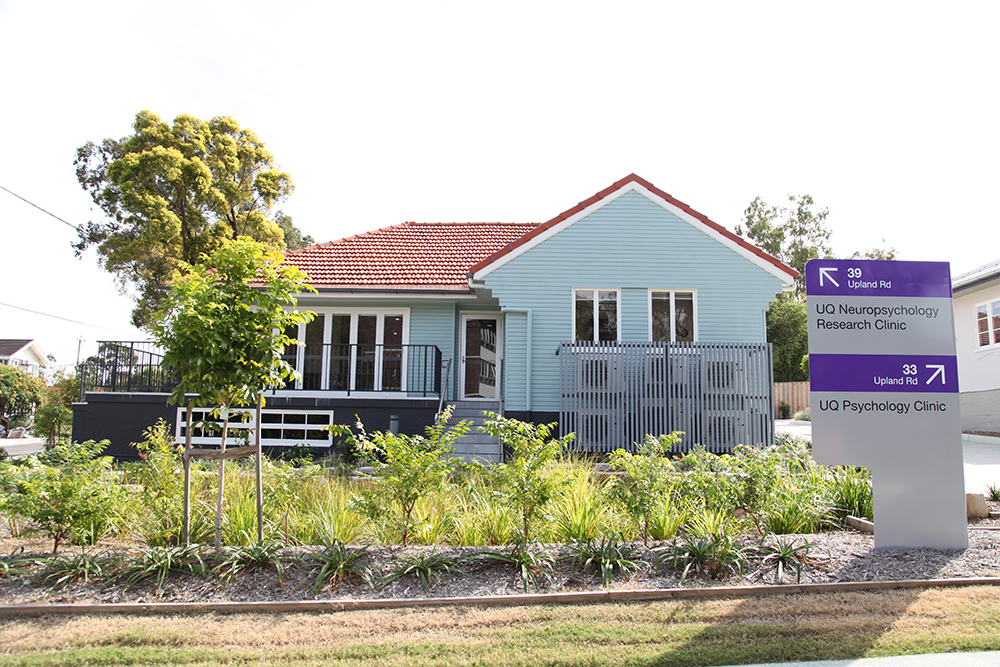The Robinson group's clinical research is focused on both theoretical questions about brain-behaviour relationships like the crucial mechanisms for the executive control of language, and clinical questions regarding cognitive assessment and management of various pathologies including neurodegenerative disorders, neurodevelopmental disorders, brain tumours and stroke.
Professor Robinson’s translational research is focussed on developing new clinical assessment tools to enable targeted rehabilitation and better outcomes.
Professor Gail Robinson has attracted internal and national funding; leading the Neuropsychology Core of large-scale longitudinal and multidisciplinary NHMRC Dementia Team Research grant and the QLD arm of a national MRFF grant to develop new diagnostic tools for young-onset dementia.
Professor Robinson was the recipient of an ARC Discovery Early Career Researcher Award (DECRA) in 2012 and a NHMRC Boosting Dementia Research Leadership Fellowship in 2018.
Group leader

Professor Gail Robinson
Research Fellow, Queensland Brain Institute
+61 7 336 56401
gail.robinson@uq.edu.au
uqnrc@uq.edu.au
UQ Researcher Profile
Post stroke, patients can experience a range of cognitive i.e., “thinking” problems, ranging from mild to severe. When people have obvious and severe difficulties (e.g., unable to talk or walk), they receive timely rehabilitation. However, current cognitive screens are not sensitive to more complex, less obvious impairments, meaning patients without global or obvious deficits often go undetected and therefore do not receive timely rehabilitation to aid recovery of functions. The Brief Executive Language Screen (BELS) is designed to detect problems with complex mental abilities (executive functions) and conversational speech (also known as propositional language), in addition to core language skills, memory, and motor speech. It is brief (15-20 minutes) and suitable for bedside administration. The BELS-Extended (BELS-E; 25-30 minutes) incorporates additional memory and core language subtests. A standalone, 5-minute verbal executive function screen is also available (BELS Sentence Completion; BELS-SC), and assesses initiation, selection, inhibition, and strategy.
BELS
BELS Standard Version Scoresheet
BELS Standard Administration and Scoring
BELS-E
BELS Extended Version Scoresheet
BELS-Extended Administration and Scoring
BELS-SC
BELS-SC Executive Functon Subtest
BELS-SC Administration and Scoring
BELS Literature
BELS Construct Validation in acute stroke (Robinson et al., 2021)
BELS Sensitivity and specificity in acute stroke (Phillips et al., 2024)
BELS-SC A brief executive function screening test (Phillips Robinson et al 2025)
BELS Normative Data
Research areas
- Neuropsychology and cognitive disorders
- Frontal lobe functions
- Assessment and neurorehabilitation
- Dementia and ageing
- Stroke
- Neurodevelopmental disorders
Research projects and populations
Professor Robinson’s Neuropsychology Research Unit conducts neuropsychological projects with individuals with a range of neurological, neuropsychiatric and neurodevelopmental disorders including Alzheimer’s disease (AD), Mild Cognitive Impairment (MCI), stroke, brain tumour, progressive supranuclear palsy, corticobasal degeneration, frontotemporal dementia, autism spectrum disorder, corpus callosal dysgenesis, bipolar disorder, motor neurone disease (MND) and highly superior autobiographical memory.
In addition, our research focuses on understanding cognition and behaviour in healthy individuals of all ages, as well as those who are in later years of life or ageing naturally. Specific projects include:
- Executive control of language generation – contribute to our understanding of the cognitive mechanisms that are crucial for producing propositional (or conversational) language. This is investigated in both healthy (all ages) and neurological populations.
- PISA - Prospective Imaging Study of Ageing: Genes, Brain and Behaviour (Dementia Research Team Grant 2015-2021). The aim of PISA is to identify preclinical biomarkers of ageing and dementia by investigating clinical cohorts (AD and MCI) and healthy middle-aged Australians at high and low genetic risk for AD and follow them longitudinally.
- Frontal lobe functions following stroke: Acute predictors of long-term outcomes – Investigate neuropsychological consequences of stroke in the acute phase that can predict independent living and ability to function in daily life after 1 year.
- Motor Neurone Disease – identify cognitive and behavioural changes and develop an online carer’s behaviour rating questionnaire (OCQ).
- Primary Progressive Aphasia – discover the critical cognitive processes affected, develop a novel assessment tool that can differentiate between the different presentations and create personalised and tailored behavioural and brain stimulation interventions.
- Movement Disorders – identify neurocognitive patterns that can differentiate between PD and atypical parkinsonian disorders like CBD and PSP.
- Corpus Callosal Dysgenesis – discovering the consequences and effective interventions for disorders of the corpus callosum, the largest fibre connecting the left and right brain, with the International Research Consortium for Corpus Callosum & Cerebral Connectivity (https://irc5.org/).
Community links
The Neuropsychology Research Unit and UQNRC are well integrated with local health services via the Royal Brisbane and Women’s Hospital (RBWH) Memory, MND and Movement Disorders Clinics, Neurosciences at the Mater Hospital, BrizBrain & Spine at the Wesley Hospital (brain tumours), and stroke units at the RBWH and Princess Alexandra Hospitals. The Robinson group provides a Dementia Diagnostic Service, which developed from the PISA project (referrals are accepted from Neurologists, Psychiatrists and Geriatricians).
Participate as a volunteer for neuropsychology research
If you are interested in volunteering as a research participant please email the Neuropsychology Research Clinic. We welcome individuals who are either healthy or those with a neurological diagnosis. If you have a neurological disorder, please provide a referral from your medical specialist (e.g. Neurologist, Psychiatrist, or Geriatrician).
Available PhD projects
PhD projects are available for any of the above projects. Please contact Professor Gail Robinson to discuss possibilities.
Embodied music, enveloping calm (administered by RMIT) (2023-2024)
A new tool to optimise the early and accurate diagnosis of frontotemporal dementia (MRFF Dementia, Ageing and Aged Care Mission administered by University of Sydney) (2023-2027)
Fundamental neurocognitive mechanisms underpinning creative thought (2022-2026)
Early Diagnosis and Intervention for Dementia (2018-2023)
NHMRC Boosting Dementia Research Leadership Fellowship Prospective Imaging Study of Ageing: Genes, Brain and Behaviour (PISA) (2015-2023) NHMRC Dementia Research Team Grant

Contact: uqnrc@uq.edu.au
Dedicated to enhancing brain function in health and disease through A.R.T.
- Assessment of cognition, behaviour, emotion and social function.
- Research to increase our knowledge about normal/ abnormal mind-brain function.
- Training, rehabilitation and intervention to maintain or maximise optimal function.
The Neuropsychology Research Unit is based at the UQ Neuropsychology Research Clinic (UQNRC), which is a purpose-built research facility that opened in September 2017. The vision of Professor Gail Robinson was to create a hub where students, researchers and individuals with brain disorders come together for clinical, training and research purposes. The UQNRC facilities comprise three clinic testing rooms, one with a brain physiology laboratory, and working spaces for staff and students. The UQNRC is located in a residential house on the UQ St Lucia campus, with easy access and parking, adjacent to other psychology and brain-focused facilities including the Queensland Brain Institute and the Centre for Advanced Imaging.
Related media coverage
- Edinburgh International Writer’s Festival 2019. Edinburgh, UK. Panel Discussion of Rebuilding Life After Brain Injury: Dreamtalk with Sheena McDonald and Allan Little is available on YouTube.
- Channel 10’s The Project, 2019: Waleed Aly interviews Rebecca Sharrock about her ‘highly superior autobiographical memory’ along with A/Prof Gail Robinson.
- ABC Science News and ABC Catalyst programme on ‘Memory’2019 Rebecca Sharrock and her ‘highly superior autobiographical memory’ and A/Prof Gail Robinson.
- ABC Radio National All in the Mind program 2018: This interview by Lynne Malcolm featured Rebecca Sharrock who has an unusual “Highly Superior Autobiographical Memory” and A/Prof Gail Robinson.
Professor Gail Robinson talks about the mysteries behind memory at the 2023 World Science Festival:














